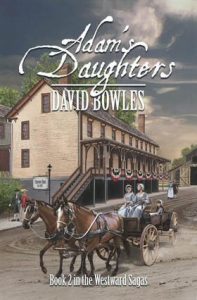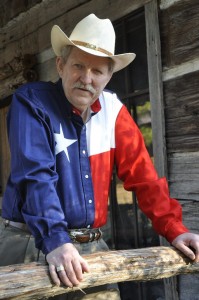 My guest today is David Bowles, a client and friend. He has just released the second book in his historical fiction trilogy, which I edited for him.
My guest today is David Bowles, a client and friend. He has just released the second book in his historical fiction trilogy, which I edited for him.
Lillie: Thank you for visiting A Writer’s Words, An Editor’s Eye today, David. Of course, I know all about Adam’s Daughters, but my readers don’t. Please tell them about your latest book.
David: The Westward Sagas tell the story of the Mitchell family’s 100-year odyssey west from Pennsylvania to Texas. In Adam’s Daughters: Book 2, Peggy Mitchell, a survivor of the Battle of Guilford Courthouse, grows up in Jonesborough, Tennessee during the tumultuous first twenty years of the nation’s existence. Though haunted by memories of war, she matures into strong, independent young woman who is courted by Andrew Jackson and who has a freed slave as her best friend. Her younger brothers and sisters become her surrogate children and students. Together the children of Adam and Elizabeth take on renegade Indians, highwaymen, and the hardships of an untamed land.
Lillie: I always like to know the story behind the story. Where did you get the idea for The Westward Sagas?
David: Actually, I started writing my family history. Adam Mitchell is my fourth great grandfather. He was a patriot in the Revolutionary War, and I wanted to share his story and the story of the rest of his family, who were also heroes. However, when I wrote the family history, it was so boring that my children and grandchildren didn’t want to read it. So I decided to write the stories as fiction so I could use my imagination and creativity to fill in the gaps in known history and add dialogue. I still wanted the history and genealogy to be accurate, so I’ve done a great deal of research.
Lillie: I’m impressed that you write nothing that couldn’t have happened. Even when you make something up, you make the story fit the known facts. In Adam’s Daughters, Peggy Mitchell is courted by and eventually spurns Andrew Jackson, who went on to become the seventh president of the United States. Can you share a little about that with my readers?
David: I’ll be happy to. There is no record that Andrew Jackson courted Peggy Mitchell. However, it is possible—perhaps likely. We know Andrew was in Jonesborough in 1788. He and Peggy were both young and unmarried, and there were not many marriageable men and women in the area at the time. Judge McNairy was a close friend of both the Mitchell family and Andrew Jackson, so it is probable that he would have introduced his friends to each other. Andrew Jackson recorded Margaret Mitchell’s will in Nashville, so he obviously had some contact with the Mitchell family. Did Andrew Jackson court Peggy Mitchell? No one knows. Is it possible? Absolutely.
Lillie: I know how meticulous your research is and how much input you get on your work in progress. Tell us something about your process.
David: I’ve always loved history and was fascinated by the stories of my ancestors I heard from my relatives when I growing up. I’ve been researching my family for years, but I did a lot more research for the books. I’ve made several trips to North Carolina and Tennessee where the stories are set, even worshipping in the church my ancestors attended more than 200 years ago. As I finished each chapter of the book, I had you do a quick edit then took it to the Christian Writers Group of the Greater San Antonio Area for critique.
Lillie: Those quick edits were just to clean up grammar, spelling, and punctuation so the writers of your critique group could focus on content.
David: The members of the group really gave me valuable feedback. I’ve learned a lot about writing from them, and my book is much better because of their input. After the critiques, you and I talked about the suggestions, and you made edits to incorporate the changes. When I finished the entire manuscript, you and I each went over it several times and discussed what we found or changes we thought were needed. One of the best things we did was a read-aloud edit.
Lillie: I encourage writers to read their work aloud, ideally to another writer or an editor, but if that’s not feasible, just reading aloud or into a tape recorder is a huge help. It’s amazing what you can discover by reading aloud that you didn’t catch when reading silently.
David: Reading aloud was helpful, and so was getting feedback from my advance readers. People who live in the area where the story is set, someone who knows Jewish customs (for a scene where Peggy and her sisters have Shabbat dinner with a Jewish family), folks who know about the history of the time and the genealogy of the people involved, and readers who enjoy a good book all gave valuable feedback. Then you and I talked again, and you incorporated the changes we agreed with. When I started writing, I had no idea there would be so many edits and revisions.
Lillie: Most writers don’t realize how much writing and re-writing comes after the first draft. Maybe it’s a good idea they don’t—they might hesitate to start writing if they did. I’m glad you started and followed through with The Westward Sagas, and I know readers agree. You’ve done a good job of building your platform and promoting your book. Tell us about it.
David: Early on, I understood that I have a large market among descendants of Adam Mitchell as well as other families in my books. I launched Adam’s Daughters in Jonesborough, Tennessee. Many of the people there are descendants of families in my books, and if they’re not descendants they know of the families. The Chester Inn is on the book cover—it was just being built in Adam’s Daughters, and it’s a landmark today, a historical building that serves today as the offices of the National Storytelling Association. The people in the area recognize it immediately and are likely to be interested in a book about their hometown. Another segment of my market is people who love history but who don’t have a direct connection to the setting or characters in my books. They enjoy reading about history and appreciate knowing that the history is accurate—either it really happened or it could have happened as written based on known history.
Lillie: You have a well-defined audience, and you’ve marketed to it successfully. I know you sold a lot of books in Jonesborough during the National Storytelling Festival as well as at the Adam Mitchell family reunion. For readers who missed you in those place, where can they buy the book? Is Adam’s daughters available both in print and e-book?
David: Yes, Adam’s Daughters is available in both print and electronic formats. Readers can order an autographed copy of the print book or download an e-book on my Web site, WestwardSagas.com. They can order the book in print and Kindle edition from Amazon.com, in print from most bookstores (often by special order), and in e-book formats at Smashwords.com. I’m happy that through Smashwords I’m participating in Operation EBook Drop—through that program I give free e-books to soldiers.
Lillie: I just wrote about Operation EBook Drop earlier this week, and I know you’ve written about it on your blog as well. Where can readers find your blog and learn more about you and your books?
David: They’re invited to visit my website, WestwardSagas.com. To read the blog, click on Blog on the menu. To learn more about me or my books, click on David Bowles or Westward Sagas.
Lillie: Is there anything else you’d like to share that I haven’t asked?
David: Just how important it is that we tell our family stories to our children and our grandchildren as the stories need to be passed on for future generations.
Lillie: Thank you for visiting. I’m sure I didn’t ask everything my readers want to know so I hope you’ll check in during the day to answer questions.
David: I’ll be glad to respond to comments. Thank you for having me as your guest today.
=====================================================================
 David Bowles, a native of Austin, Texas, lives in San Antonio with his best friend and constant companion Lulubelle, a yellow Lab. He grew up listening to stories of his ancestors told by family members in the generation before him. The stories fascinated David so much that he grew up to become a tale-spinner, spinning tales through the written word in The Westward Sagas and through the spoken word speaking to groups of both adults and children.
David Bowles, a native of Austin, Texas, lives in San Antonio with his best friend and constant companion Lulubelle, a yellow Lab. He grew up listening to stories of his ancestors told by family members in the generation before him. The stories fascinated David so much that he grew up to become a tale-spinner, spinning tales through the written word in The Westward Sagas and through the spoken word speaking to groups of both adults and children.
David started writing stories of his family to ensure that his children and grandchildren had accurate records of the family history. However, while the original versions, written in narrative textbook style, did maintain the records, they didn’t maintain the interest of the readers. So he used his imagination and creativity to fill in the gaps of what might have happened when the details weren’t available. He created dialogue and scenes to add true life drama to the story of the Mitchell Family from colonial days to the settlement of the West. He hopes these stories fascinate his readers as much as the stories of his ancestors have always fascinated him.
Disclosure:David pays me for work I do but did not pay for this interview. The Amazon link is an affiliate link; if you order books through the other links, I do not make a commission.
